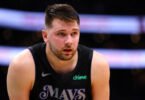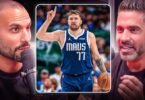had the chance: Lakers dominated with the best players—Kobe Bryant, Magic Johnson, and Kareem Abdul-Jabbar—but didn’t stand a chance against…**
The Los Angeles Lakers, one of the most storied franchises in NBA history, have had their fair share of legendary rosters. From Magic Johnson’s flashy assists to Kareem Abdul-Jabbar’s unstoppable skyhook, and Kobe Bryant’s killer instinct, the Lakers have always been synonymous with basketball excellence. However, despite boasting some of the greatest players to ever play the game, there have been moments when the team found themselves at a disadvantage, unable to reach the pinnacle of success they had so often tasted in the past.
**The Glory of the Lakers’ Dynasty**
The Los Angeles Lakers’ legacy began with the arrival of Magic Johnson in the late 1970s. Johnson, a 6-foot-9 point guard, revolutionized the game with his vision and playmaking ability. Alongside him was Kareem Abdul-Jabbar, the NBA’s all-time leading scorer, whose dominant presence in the paint was felt across the league. The duo helped lead the Lakers to multiple championships during the 1980s, establishing the “Showtime” era that would become the benchmark for fast-paced, high-scoring basketball.
Magic and Kareem were joined by other key players like James Worthy, Michael Cooper, and Byron Scott, making the Lakers a dominant force throughout the decade. The team’s chemistry and talent on both ends of the court made them nearly unbeatable, capturing five NBA championships in the 1980s alone. They were a well-oiled machine that left opponents scrambling for answers.
However, even during this time of great success, there were challenges. The Boston Celtics, led by Larry Bird, and later teams like the Detroit Pistons and Chicago Bulls, presented significant hurdles to the Lakers’ dominance. The Lakers were consistently contenders, but sometimes, despite their talent, the team found themselves unable to overcome the fierce competition that stood in their way.
**The Mamba Mentality Takes Over**
The 1990s and early 2000s saw a new era for the Lakers, with the rise of Kobe Bryant. Entering the league straight out of high school in 1996, Bryant quickly became one of the most electrifying players in the NBA. His work ethic, drive, and ability to perform in clutch moments earned him the nickname “The Black Mamba.” Bryant was a different type of player than Magic or Kareem—more individualistic and driven by a fierce desire to outwork everyone around him.
Kobe, however, wasn’t alone in his pursuit of greatness. In 1996, the Lakers made a bold move by acquiring center Shaquille O’Neal, and together they formed a dynamic duo that would lead the team to three consecutive NBA championships from 2000 to 2002. The Lakers were unstoppable, dominating teams with their combination of Kobe’s scoring and Shaq’s inside presence. The team seemed poised to continue their success, with a promising future ahead.
But once again, history showed that even the greatest teams can be upended. Despite the back-to-back-to-back championships, there were instances when the Lakers found themselves in tough matchups, facing formidable opponents that were able to disrupt their flow. The 2004 Finals, for example, saw the Lakers’ highly talented roster fall short against the Detroit Pistons, a team known for its tough defense and gritty play. Despite having four future Hall of Famers (Shaq, Kobe, Gary Payton, and Karl Malone), the Lakers couldn’t overcome the defensive juggernaut that was the Pistons, who won the series in five games.
**The Search for Redemption**
The Lakers’ search for redemption continued through the mid-2000s, as the team retooled and once again found themselves in the NBA Finals in 2008. The addition of Pau Gasol in 2008 made the Lakers a more balanced team, and Kobe Bryant, in the prime of his career, led the charge with a renewed focus. However, the 2008 NBA Finals saw the Lakers face the Boston Celtics once again, this time with a new generation of players, including Paul Pierce, Kevin Garnett, and Ray Allen.
Despite the Lakers’ talent and Kobe’s heroics, they were unable to overcome the Celtics’ defense and intensity, losing the series 4-2. The defeat was a bitter pill to swallow for Bryant and the Lakers, who were forced to confront the reality that even the best players in the game sometimes have to face adversity that is beyond their control.
**A New Beginning**
But Kobe, always driven by a desire to prove his doubters wrong, bounced back. The following year, in 2009, the Lakers found themselves back in the Finals, this time against the Orlando Magic. With Kobe leading the charge, they defeated the Magic in five games, capturing their 15th NBA title and the first of the post-Shaq era.
The Lakers didn’t stop there. They went on to win the 2010 NBA Finals as well, once again facing their long-time rivals, the Boston Celtics. This time, the Lakers were victorious, with Kobe Bryant earning his fifth NBA championship ring and solidifying his place among the greatest players of all time. The 2010 Finals were a hard-fought series, but the Lakers’ combination of experience, talent, and resolve helped them overcome the Celtics in a thrilling seven-game series.
However, as the years went by, the Lakers’ roster began to change. Injuries took their toll on key players, and the team struggled to maintain the level of dominance they had once enjoyed. After Kobe’s Achilles injury in 2013 and Shaq’s departure from the team, the Lakers entered a rebuilding phase, trying to find the next generation of stars to lead them back to championship contention.
**The Unpredictability of Basketball**
The Lakers’ story is one of triumph, heartbreak, and resilience. Despite having some of the greatest players to ever play the game—players who could dominate offensively, change the course of a game with a single shot, and inspire entire generations—the team faced countless challenges along the way. There were moments when they seemed invincible, but basketball is unpredictable, and the competition is fierce.
The Lakers had the chance, time and time again, to cement their legacy as the greatest dynasty in NBA history. But the game is more than just talent; it’s about chemistry, timing, and overcoming obstacles. No matter how stacked the roster was, the Lakers didn’t always have the chance to walk away with a title. Sometimes, it wasn’t about their lack of ability—it was about how the game unfolded, the matchups, and the sometimes unexplainable nature of sports.
In the end, the Lakers’ legacy remains intact. The championships they won, the players they showcased, and the moments they provided fans are etched into NBA history. But even with all that success, the reality remains that not every team, no matter how talented, can always stand a chance against the unpredictability of the game.





